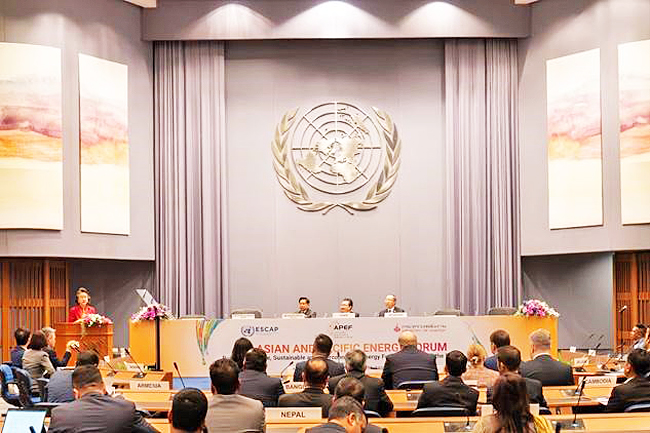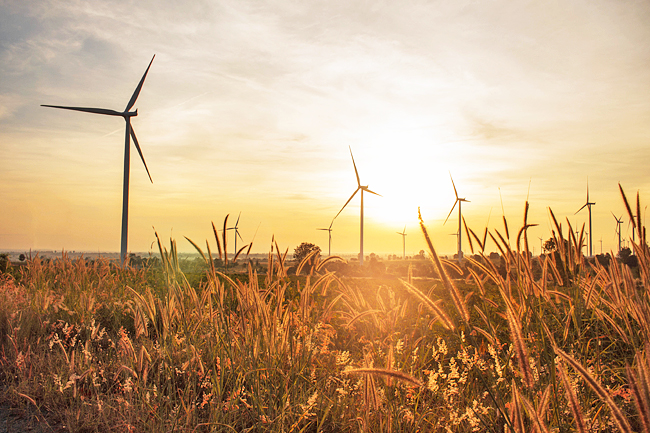United Nations commission all set to charter a path towards a sustainable and climate-resilient future
Home to over half of the world’s population, the Asia and Pacific region stands at a crucial crossroads in the ongoing global energy transition.
The region already consumes more than 40 per cent of the planet’s energy and contributes to over 50 per cent of global greenhouse gas emissions.
These figures are expected to rise significantly due to the region’s rapid development, leading to a surge in energy demand in the years ahead.
This escalating demand places a strain on financial resources, exerts pressure on natural ecosystems, and adds stress to the environment. It also poses significant challenges to the region’s efforts to fulfil its climate change commitments.
This was highlighted in the recent report by the United Nations (UN) Economic and Social Commission for Asia and the Pacific (ESCAP) titled ‘Closing the Gap for Sustainable Development Goal 7 (SDG 7) in the Asia-Pacific Region: Regional Trends Report on Energy for Sustainable Development 2023’.
The report was unveiled ahead of the 3rd Asian and Pacific Energy Forum (APEF3), with the objective of examining the progress made by Asia-Pacific countries towards achieving SDG 7 in the decade of action on the SDGs.
SDG 7 aims for universal access to affordable, reliable, sustainable, and modern energy by 2030. Notably, this achievement has become increasingly intricate given the region’s dynamic and complex energy landscape.
ESCAP, as one of the UN’s five regional commissions, stands as the foremost inclusive intergovernmental platform in the Asia-Pacific region. Its mission centres on fostering cooperation among its 53 member states and nine associate members to address the complex challenges of sustainable development. The ESCAP secretariat plays a pivotal role in advancing inclusive, resilient, and sustainable development within the region.
It achieves this by generating practical knowledge and offering technical support, capacity-building services, and alignment with national development goals, regional agreements, and the 2030 Agenda for Sustainable Development.

PURSUING SUSTAINABLE DEVELOPMENT AMIDST GLOBAL CRISES
Under Secretary-General of the United Nations and Executive Secretary of ESCAP Armida Salsiah Alisjahbana in the report’s foreword said that Asia-Pacific nations are intensifying efforts to meet the 2030 Agenda for Sustainable Development in the face of global crisis, with a particular focus on SDG 7, affordable and clean energy.
In her foreword, she highlighted vital role of energy in sustainable development as it is interlinked with multiple SDGs, noting an urgency that is rooted in the fact that energy sector emissions are key drivers of
climate change.
In light of this, she continued, rapid decarbonisation becomes paramount for the success of the Paris Agreement.
And despite all the challenges such as rising prices and energy security concerns, sustainable energy solutions like renewables, energy efficiency, and cross-border power connectivity offer pathways to lower costs and enhanced security.
Due to this, the UNESCAP Undersecretary-General believes that the report’s release before the Third Asian and Pacific Energy Forum (APEF3) aligns with its theme, “Building a secure, sustainable, and interconnected energy future for Asia and the Pacific”, emphasising sustainability, regional cooperation, and resilience. It serves as a foundation toward realising this vision.
The report emphasises that delivering on SDG7 in the Asia-Pacific region demands a substantial significant shift in investment towards clean energy technologies while reducing reliance on fossil fuels.
Despite some progress however, access to modern energy services remains a significant challenge, with millions lacking electricity and clean cooking fuels.
The region’s heavy dependence on coal, oil and natural gas exacerbates climate change and pollution, posing financial risks, therefore the controlled phase-out of fossil fuels, particularly coal, is crucial for a successful energy transition.
Therefore, in order to achieve SDG7 by 2030, there needs to be more collaborative efforts between governments, businesses, and civil society focusing on universal energy access, renewable energy adoption and enhanced efficiency.

ACCELERATING THE ENERGY TRANSITION
Over the past two decades, the Asia-Pacific region has witnessed rapid growth, yet its energy supply remains largely reliant on fossil fuels. In 2020, coal constituted 42.2 per cent of the energy supply, followed by oil at 23.4 per cent and natural gas at 19.1 per cent.
Given that the energy sector contributes approximately 80 per cent of the region’s greenhouse gas emissions, transitioning away from fossil fuels, particularly the gradual reduction of coal usage, and striving for net-zero emissions by mid-century are imperative actions.
These steps are essential not only for the region but also for global efforts to avert catastrophic climate change.
Despite the region’s growing energy demands, coal, gas and oil have predominantly fuelled its growth over the past three decades.
Nevertheless, there has been a notable increase in renewable energy’s share in the energy supply, driven by technological advancements and declining costs. This trend is set to gain momentum in the years ahead.
The transition to clean energy is vital due to the sector’s significant contribution to greenhouse gas emissions.
Meanwhile, energy intensity improvement, while making progress, falls short of the global SDG7 target.
Only a few countries, such as China, Indonesia and Japan have exceeded this target. The region still grapples with challenges in providing universal access to clean cooking fuels, with traditional biomass being the primary source for cooking and heating.
However, the transition to sustainable energy presents several opportunities, but tailored policy solutions and collaboration with stakeholders are pivotal.
The expansion of renewable energy sources and improvements in energy efficiency offer ways to maintain reliability.
Mobilising finance, mainly from the private sector, is essential, necessitating bankable projects and supportive environments.
Dealing with critical raw materials (CRMs) requires a holistic approach, with potential solutions in domestic exploration, supply chain resilience and international cooperation.
The energy transition should be just and equitable, aligning with sustainable development and climate agendas. The COVID-19 pandemic and the Ukraine crisis have reinforced the need for greater energy efficiency and resilience.
The report, in summary, states that the region must accelerate efforts towards the energy transition and achieving SDG7.
Recommendations include improving enabling environments, increasing private sector engagement, deploying risk allocation and investment strategies, enhancing energy connectivity, managing access to CRMs and ensuring a just energy transition that leaves no one behind.
These actions are vital to propel the region towards a sustainable and equitable energy future. – Izah Azahari






